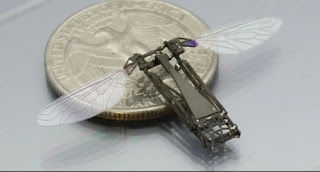Scientists are making huge strides in drone aircraft, those pilotless planes that are playing an increasingly important role on the battlefield. Now we may be on the verge of creating drones the size of insects using an inexpensive technology that starts with thin sheets of raw material and then uses an automated origami-like process to cut, bend and fold the sheets into their final shape. The process is fast, cheap and reliable, and adding radio controls and sensing mechanisms is also expected to be easy.
You can read an article about the technology here.
What will these "robotic bees" be used for? The military potential is obvious. Imagine millions of cheaply produced robo-bees dropped on a battlefield, or a civilian city, each with the ability to detect human presence and deliver a fatal "sting" before it's even seen. Also consider that these low cost devices will be within the reach of almost any country to build or purchase, and we're looking at a new and very unpleasant dimension to warfare.
In recent years we've made great progress in understanding and manipulating the world of matter and energy, but very little progress in understanding the world of mind and soul, and the drives and urges that underlie human behavior. Unless we can better understand ourselves, and better control the destructive side of our nature, new technology, despite its benefits, will also have the capacity to do us enormous harm.
Wednesday, February 29, 2012
Thursday, February 23, 2012
Interview with Bill Davidow
 |
| Bill Davidow |
Subscribe to:
Posts (Atom)
